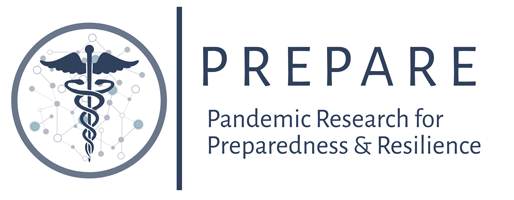Members
PREPARE is a global network of passionate members who drive forward the scientific and public health advances necessary to ready us for the next pandemic. Join us to grow your network, find and share upcoming events, and participate in our workshops!
Enter keywords to search the member names or info cards:
Kaja Abbas
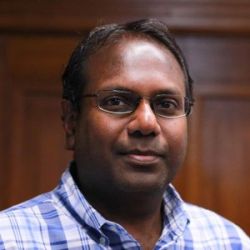
- Associate Professor of Epidemiology and Population Health
Dr. Abbas's research area is vaccine impact modeling with a focus on estimating the health, economic, and equity impact of vaccination programs to support evidence-based decision-making on vaccination strategies in collaboration with partners and stakeholders at the global, regional, and national levels. I have worked on impact assessment of existing and new vaccines to inform vaccine policy in varied contextual settings of low-, middle-, and high-income countries.
He welcomes collaborations related to estimating vaccination impact in different geographic settings and encourages them to contact him. Open to collaborators.
Epidemiology and Public Health, Education, Training, and Workforce Development, Social, Behavioral, Economic, and Governance
Antwi Melody Ama

- MPhil Immunology Candidate
Education, Training, and Workforce Development
Archana Anand

- Assistant Professor of Biology
Archana Anand is an engineer and marine biologist. She primarily works on the interface between environmental engineering and coastal marine microbiology. Archana is intrigued by microbes that drive several vital biogeochemical processes in the land and ocean. Today, she researches microbes in wastewater while developing and applying bioinformatics techniques to understand the mixed microbial communities involved in nutrient removal and cycling as well as emerging infectious disease pathogens.
Applications of her work have ranged from SARS-CoV-2 tracking in wastewater to inform community health in the United States, development and application of marine monitoring methods using stable isotope analysis, characterizing the impact of wastewater-derived nutrients on coastal ecosystems in megacities, and educating adults and children on the 'hidden life of the sea'.
Archana won the National Geographic Explorer Award in 2019 to support her work in mapping coastal biodiversity in the scientifically understudied Andaman & Nicobar Islands. She obtained her PhD in Ecology & Biodiversity from the University of Hong Kong and her B.Eng from the National University of Singapore.
Epidemiology and Public Health, Infodemiology, Social Networks, and Scientific Communication, Education, Training, and Workforce Development, Computational Biology and Bioinformatics
Roy Anderson
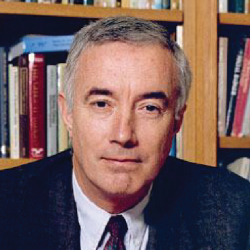
- Professor of Infectious Disease Epidemiology
Sir Roy is Professor of Infectious Disease Epidemiology in the School of Public Health, Faculty of Medicine, Imperial College London, and Director of the Centre for Neglected Tropical Disease Research. His recent appointments include Rector of Imperial College London and Chief Scientist at the Ministry of Defence, UK. His research interests are in interdisciplinary studies at the interface between medicine, biology, mathematics, and computation.
Sir Roy has also served as Director of the Wellcome Centre for Parasite Infections from 1989 to 1993 (at Imperial College London) and as Director of the Wellcome Centre for the Epidemiology of Infectious Disease from 1993 to 2000 (at the University of Oxford). He is the author of over 450 scientific articles and has sat on numerous government and international agency committees advising on public health and disease control including the World Health Organisation, Bill and Melinda Gates Foundation, and UNAIDS. From 1991-2000 he was a Governor of the Wellcome Trust.
He currently is a Trustee of the Natural History Museum, a Member of the Singapore National Research Foundation Fellowship Board, a Member of the International Advisory Committee of Thailand National Science and Technology Development Agency, and a Member of the Malaysian Biotechnology Advisory Board. He is a non-executive director of GlaxoSmithKline and a member of the International Advisory Board of Hakluyt and Company Ltd.
He is an Honorary Fellow of the Institute of Actuaries, the Royal College of Pathologists, the Royal Society of Agriculture, and the Royal Statistical Society. He is also an honorary member of the Royal College of Physicians.
Sir Roy was elected Fellow of the Royal Society in 1986, a Founding Fellow of the Academy of Medical Sciences in 1998, a Foreign Associate Member of the Institute of Medicine at the US National Academy of Sciences in 1999, and a Foreign Member of the French Academy of Sciences in 2009. He was knighted in the 2006 Queen's Birthday Honours.
Epidemiology and Public Health, Infodemiology, Social Networks, and Scientific Communication
Joshua Attih
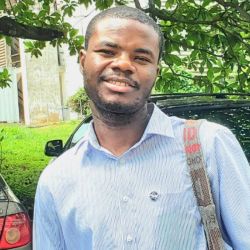
Joshua Attih is a passionate young professional deeply fascinated by the wonders of Astronomy and Space Sciences. His keen interest lies in exploring the realms of instrumentation and leveraging cutting-edge machine-learning approaches to unravel the mysteries of the universe. By addressing the most profound questions in Space Science studies, he aims to contribute to groundbreaking discoveries that transcend boundaries and find applications across diverse fields, including life sciences and all areas of STEAM (Science, Technology, Engineering, Arts, and Mathematics).
As an ardent believer in the power of human potential, he is driven to inspire and empower the next generation of space enthusiasts. He envisions a future where our collective efforts pave the way for humanity's expansion beyond Earth, transforming us into a multi-planetary species. By developing innovative tools and methodologies today, he aims to lay the foundation for a future where space exploration becomes an integral part of our existence, shaping a new era of scientific exploration, technological advancement, and limitless possibilities.
With an unwavering commitment to excellence, curiosity, and interdisciplinary collaboration, he is dedicated to pushing the boundaries of our understanding of the cosmos. By embracing the challenges of our highly advanced world and leveraging the advancements in space science and related disciplines, he strives to create a lasting impact that inspires future generations.
Computational Biology and Bioinformatics
Giridhara R. Babu
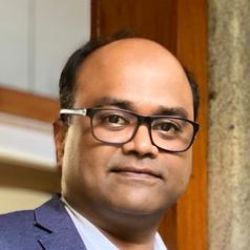
- Professor and Head of Life Course Epidemiology
Dr. Babu is the Professor and Head of Life Course Epidemiology at the Public Health Foundation of India. He has a medical degree (MBBS) from Kasturba Medical College, Manipal, and has completed an MPH and PhD from the University of California, Los Angeles (UCLA). He has two decades of experience in public health research, practice, and academics. He began his career at the Center for Community Medicine, All India Institute of Medical Sciences (AIIMS), New Delhi as a Junior Resident, and also worked with the World Health Organization (WHO), where he led the efforts to stop polio transmission in the state of Karnataka. He initiated advocacy for Measles surveillance in Karnataka, leading to the constitution of the Multi-Year Plan (MYP) for Measles elimination in India. He has been awarded the prestigious intermediate and now the senior fellowship of Wellcome Trust-DBT India Alliance to start and expand a cohort study in Bangalore. The cohort is named MAASTHI (Maternal Antecedents of Adiposity Studying the Transgenerational Role of Hyperglycemia and Insulin).
Saikat Basu
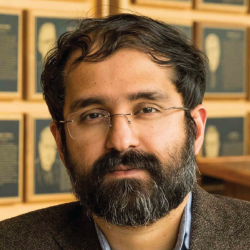
- Assistant Professor of Mechanical Engineering
The Basu Lab is housed at the Department of Mechanical Engineering at South Dakota State University. We develop theoretical and computational fluid mechanics models of transport in complex biomedical systems, e.g., in respiratory physiology and in cancerous tumors. To validate the modeling framework, we collaborate with our peers specializing in experiments. The collaborations are often supplemented with our own simple in-house experiments performed in 3D-printed anatomic geometries.
Epidemiology and Public Health, Computational Biology and Bioinformatics
Brett Bayles

- Associate Professor of Global Public Health
Brett is an interdisciplinary global public health professor and scientist. His research focuses on planetary health and on better understanding the human health impacts of global environmental change. He has worked on projects at the intersection of health and the environment in East Africa, Costa Rica, and numerous locations throughout the United States. He teaches courses in epidemiology, applied biostatistics, global environmental health, and planetary health perspectives from Costa Rica.
Epidemiology and Public Health
Abhinav Bhusan
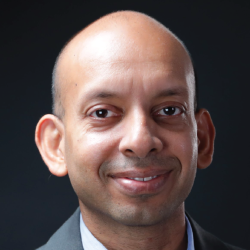
- Associate Professor of Biomedical Engineering
Dr. Abhinav Bhusan received his PhD in Mechanical Engineering from Louisiana State University, and postdoctoral training from the University of California Davis and Massachusetts General Hospital/Harvard Medical School/Shriners Boston. As an NIH K30 scholar at UC Davis, he obtained a second M.S. in Advanced Clinical Research. His lab's research is at the intersection of microfluidics (polymer and metal), cell and molecular biology, and medical devices. He participated in the NSF I-CORPS program to assess the market fit of a technology under development in my lab. He teaches courses in Biofluid mechanics, Medical devices, and Synthetic biology. He has received numerous awards, including an NIH K99/R00, an NSF CAREER Award, and the CMBE Young Innovator Award. He is passionate about student success and loves to develop out-of-the-box learning opportunities (First Sustainability Hackathon at Harvard) and participate in fun ways of communicating science.
Education, Training, and Workforce Development, Computational Biology and Bioinformatics
Glen Borchert
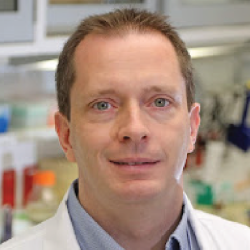
- Associate Professor of Pharmacology and Biology
Research in the Borchert laboratory explores the regulation of gene expression by noncoding RNAs and G4s. Our main focuses are on microRNAs (miRNAs), microRNA-like sequences excised from other RNAs (e.g., tRNAs and snoRNAs), sRNAs (similarly functioning short noncoding RNAs in prokaryotes), and long noncoding RNAs. Our lab examines the roles noncoding RNAs and G4 structures play during growth and development, infectious disease, how their misregulations contribute to various diseases and oncogenesis, and also how they evolve and contribute to speciation.
Computational Biology and Bioinformatics
Adam Bouras
- Public Health Informatics Fellow
Epidemiology and Public Health, Infodemiology, Social Networks, and Scientific Communication, Education, Training, and Workforce Development, Computational Biology and Bioinformatics, Surveillance & Contact Tracing, Computing & Data Infrastructure, and Privacy, Social, Behavioral, Economic, and Governance
Thomas Carton
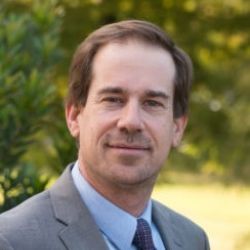
- Director of Analytics
As Chief Data Officer and former Director of Health Services Research for the Louisiana Public Health Institute (LPHI), Dr. Thomas Carton leads multiple teams that conduct various types of health services research that span clinical research, quality improvement, and social epidemiology. As Principal Investigator of the Research Action for Health Network (REACHnet), Dr. Carton leads a multi-institutional and multi-disciplinary team that is creating a regional informatics, patient engagement, and research infrastructure to efficiently conduct comparative effectiveness research. Both positions underscore the importance of collaborative work grounded in frequent communication, careful planning and budgeting, realistic research objectives, and mentoring within and beyond my organization. He holds (or held) multiple leadership positions within PCORnet (the national Patient-Centered Research Network), including Chair of the PCORnet Steering Committee and leading or co-leading working groups on data linkage, health services, and public health research, research innovations, and cross-network collaborative research. Locally, Dr. Carton serves on the board of the community health information exchange, the Greater New Orleans Health Information Exchange. He is also an Adjunct Professor in Global Health Systems and Development at the Tulane University School of Public Health and Tropical Medicine, where he teaches doctoral-level econometrics classes and mentors pre-doctoral trainees in advanced statistical and econometric methods.
Epidemiology and Public Health, Infodemiology, Social Networks, and Scientific Communication, Social, Behavioral, Economic, and Governance
Changqing Cheng
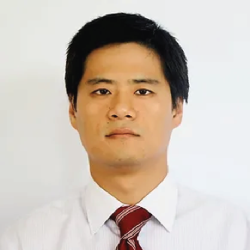
- Associate Professor of Systems Science and Industrial Engineering
Dr. Cheng's research focus is sensing and data-driven modeling; simulation and analytics for process monitoring; quality control and performance optimization of complex systems; with special interests in nonlinear dynamics and the resulting chaotic patterns, recurrence, and self-similarity behaviors. In the field of manufacturing, he's interested in optimal design, uncertainty quantification, and sensing data analytics for change/anomaly detection, and in the field of healthcare, he's interested in data fusion, time series analysis, and epidemic modeling.
Infodemiology, Social Networks, and Scientific Communication, Surveillance & Contact Tracing, Computing & Data Infrastructure, and Privacy
Wai-Yim Ching
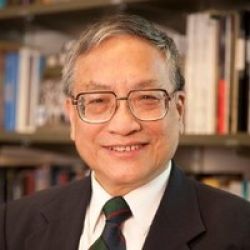
- Professor of Physics
Dr. Wai-Yim Ching is a Curators’ Distinguished Professor of Physics at the University of Missouri-Kansas City in USA. He leads the Electronic Structure Group (ESG) in the Department of Physics and Astronomy. His research focuses on condensed matter theory and computational materials science using first-principles methods. He developed the orthogonalized linear combination of atomic orbitals (OLCAO) method particularly suitable for large complex systems including biomolecular systems. With more than 40 years of experience, he is an author or co-author of over 425 journal articles with Google Scholar H-factor 68. He is an Academician of World Ceramic Academy, Fellow of the American Ceramic Society, Fellow of the American Physical Society and Fellow of the Royal Society of Chemistry in Britain. He received the University of Missouri’s Presidential Award for Sustained Career Excellence in 2017. He is an Associate Editor of the Journal of the American Ceramic Society and is on the Editorial Board of Nature Scientific Reports.
Computational Biology and Bioinformatics
Rita Colwell
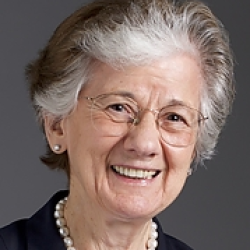
- Distinguished University Professor of Cell Biology and Molecular Genetics
Rita Colwell is a Distinguished University Professor at the University of Maryland at College Park and at Johns Hopkins University Bloomberg School of Public Health, senior advisor and chairman emeritus at Canon US Life Sciences, Inc., and president and chairman of CosmosID, Inc.
Dr. Rita Colwell's interests are focused on global infectious diseases, water, and health. Dr. Colwell developed an international network to address emerging infectious diseases and water issues, including safe drinking water for both the developed and developing world, in collaboration with Safe Water Network, headquartered in New York City.
She served as the eleventh director of the National Science Foundation (NSF) from 1998 to 2004. In her capacity as NSF director, she served as co-chair of the Committee on Science of the National Science and Technology Council. Before joining NSF, Dr. Colwell was president of the University of Maryland Biotechnology Institute and a professor of microbiology and biotechnology. She was also a member of the National Science Board from 1984 to 1990.
One of Colwell's major interests is K-12 science and mathematics education, graduate science and engineering education, and the increased participation of women and minorities in science and engineering.
She has held many advisory positions in the U.S. government, nonprofit science policy organizations, and private foundations, as well as in the international scientific research community. Colwell is a nationally respected scientist and educator and has authored or co-authored 19 books and more than 800 scientific publications. She produced the award-winning film, "Invisible Seas," and has served on editorial boards of numerous scientific journals, including GeoHealth, which she founded at AGU in 2015.
Dr. Colwell has previously served as Chairman of the Board of Governors of the American Academy of Microbiology and also as President of the American Association for the Advancement of Science, the Washington Academy of Sciences, the American Society for Microbiology, the Sigma Xi National Science Honorary Society, the International Union of Microbiological Societies, and the American Institute of Biological Sciences (AIBS).
Dr. Colwell is a member of the U.S. National Academy of Sciences, the Royal Swedish Academy of Sciences, Stockholm, the Royal Society of Canada, the Royal Irish Academy, the Bangladesh Academy of Science, the Indian Academy of Sciences, the American Academy of Arts and Sciences, and the American Philosophical Society. Colwell is an honorary member of the microbiological societies of the UK, Australia, France, Israel, Bangladesh, Czechoslovakia, Royal Irish Academy, and the U.S. She has held several honorary professorships, including the University of Queensland, Australia.
Colwell has been awarded 62 honorary degrees from institutions of higher education, including her alma mater, Purdue University. A geological site in Antarctica, called Colwell Massif, has been named in recognition of her work in the Polar Regions. Colwell has published a new book, "A Lab of One's Own: One Woman's Personal Journey Through Sexism in Science".
Wandi Ding
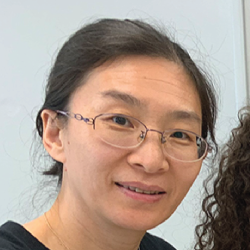
- Professor of Mathematical Sciences
Dr. Ding is a professor and an M.S. Graduate Program advisor in the Department of Mathematical Sciences at Middle Tennessee State University. She serves as faculty for the Interdisciplinary Ph.D. in Computational and Data Science Program, as well as the Honors College. She is an active learner and user of SIMIODE (Systemic Initiative for Modeling Investigations and Opportunities with Differential Equations), which is a Community of Practice dedicated to using modeling to teach differential equations, and she serves as Board of Contributing Advisors for SIMIODE (2017 – current). She works together with Dr. Judith Iriarte-Gross to serve as co-president for the Association for Women in Science (AWIS) Tennessee Chapter (2021-current).
Dr. Ding's research interests include mathematical biology, optimal control, computational biology, mathematical modeling, ordinary and partial differential equations, difference equations, agent/individual-based modeling, and hybrid systems with applications to population dynamics, disease modeling, and control; natural resource management; and systems biology. She is also interested in deep learning and quantum biology and improving undergraduate STEM education through research experiences. Dr. Ding's research focuses on understanding the spatial and temporal patterns that arise in dynamic biological systems and, when possible, finding the best way to control the system.
Epidemiology and Public Health, Infodemiology, Social Networks, and Scientific Communication, Education, Training, and Workforce Development, Computational Biology and Bioinformatics
Spencer Dugbartey
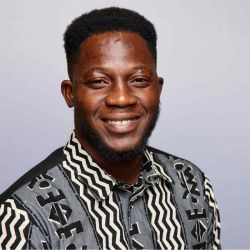
- Molecular Technologist
Epidemiology and Public Health
Dominique Duncan

- Assistant Professor of Neurology
Dr. Dominique Duncan is an assistant professor of Neurology at the USC Stevens Neuroimaging and Informatics Institute in the Laboratory of Neuro Imaging (LONI) with joint appointments in Neuroscience and Biomedical Engineering. Dr. Duncan’s background spans mathematics, engineering, and neuroscience. She double majored in Mathematics and Polish Literature as an undergraduate at the University of Chicago and minored in Computational Neuroscience. She earned her Ph.D. in Electrical Engineering at Yale University. In her Ph.D. thesis, she analyzed intracranial EEG data using nonlinear factor analysis to identify preseizure states of epilepsy patients. After receiving her Ph.D., she was a professor of Mathematics at Sichuan University in Chengdu, China, for a summer program for undergraduate students. She then took a postdoctoral position in Neurology at the Stanford University School of Medicine, followed by a postdoctoral position in Mathematics at UC Davis, where she developed an algorithm based on diffusion maps to classify Alzheimer’s patients using MRI. She has built international, multidisciplinary collaborations and developed novel analytic tools to analyze multimodal data, including imaging and electrophysiology. Her interests lie at the intersection of data analysis, signal processing, and machine learning, particularly in the areas of traumatic brain injury, epilepsy, and, more recently, COVID-19. By creating large-scale data repositories and linking them with visualization and analytic tools for both neuroimaging and electrophysiology data, as well as multimodal data of COVID-19 patients, she aims to encourage collaboration across multiple fields. Dr. Duncan also uses virtual reality to optimize the process of analyzing neuroimaging data and to improve neuroscience education among K-12 students.
Education, Training, and Workforce Development, Computational Biology and Bioinformatics
Andreas Eilersen

- Postdoctoral Researcher
Epidemiology and Public Health, Infodemiology, Social Networks, and Scientific Communication, Computational Biology and Bioinformatics
Ceyhun Eksin
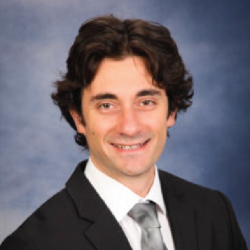
- Corrie and Jim Furber '64 Assistant Professor of Industrial and Systems Engineering
He is the Corrie and Jim Furber ’64 assistant professor at Industrial and Systems Engineering Department and Electrical and Computer Engineering Department (by courtesy) at Texas A&M University. He is also a 2023 Texas A&M Institute of Data Science Career Initiation Fellow and a recipient of NSF CAREER in 2023.
He received his Ph.D. in Electrical and Systems Engineering from the University of Pennsylvania in 2015 under the supervision of Alejandro Ribeiro. He was subsequently a Postdoctoral Fellow at the Georgia Institute of Technology affiliated with both the School of Electrical & Computer Engineering and the School of Biological Sciences hosted by Jeff S. Shamma and Joshua S. Weitz.
The research interests of his lab focus on understanding and designing networked interactions of agents in social and technological settings. Examples of such complex systems are found in energy systems (microgrid, demand response), public health (infectious diseases), autonomous robot systems, communication (uplink power allocation), and many other cyber-physical systems. Broadly, the theoretical interests of the lab are at the confluence of game theory, distributed optimization, signal processing, and control theory. We invite you to visit the Research section for a more detailed explanation of the research themes of the lab. You can find the specific research papers in Publications.
Epidemiology and Public Health, Social, Behavioral, Economic, and Governance
Stuart Feldman
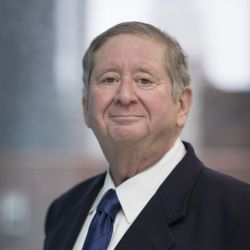
- Chief Scientist
Stuart Feldman is Co-CEO and Chief Scientist of Schmidt Futures where he is responsible for the Scientific Knowledge programs, including creating fellowship programs, supporting nascent innovative research projects, and driving new platforms and larger research projects that aim to change the way scientific research is done.
Stuart did his academic work in astrophysics and mathematics and earned his AB at Princeton and his PhD at MIT. Stuart is best known for writing “Make” and other essential tools. He was awarded an honorary Doctor of Mathematics by the University of Waterloo. He is the former President of ACM (Association for Computing Machinery) and a former member of the board of directors of the AACSB (Association to Advance Collegiate Schools of Business). He received the 2003 ACM Software System Award. He is a Fellow of the IEEE, ACM, and AAAS. He is the Board Chair of the Center for the Minorities and Disabled in IT, serves on a number of university advisory boards and National Academy panels, and has served on a wide variety of government advisory committees.
Edem Fiatsonu
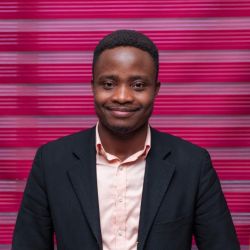
- Graduate Student Research Assistant in the College of Veterinary Medicine & Biomedical Sciences
Edem seeks to investigate and understand the dynamics and the spread of infectious diseases using mathematical models.
Epidemiology and Public Health, Infodemiology, Social Networks, and Scientific Communication, Computational Biology and Bioinformatics
Trina Fletcher
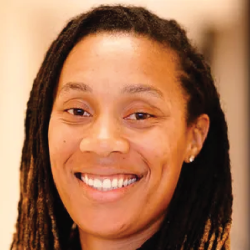
- Assistant Professor of Engineering Education
Dr. Trina L. Fletcher is an Assistant Professor at Florida International University and has extensive experience across industry, the non-profit sector and academia when it comes to underrepresented minorities (URMs) and women in engineering and computing education. Her research areas include diversity, equity and inclusion within K-12 STEM education and the role of historically black colleges and universities (HBCUs) on the production of Blacks in STEM. Additionally, Dr. Fletcher is focusing on how proven industry best practices, such as Six Sigma, can be used to recruit and retain women and minorities in engineering and computing for both higher education and industry. She is currently a steering committee member for EngineerGirl, an initiative by the National Academy of Engineering (NAE) to increase the number of girls going into engineering. She is also an associate editor for the Journal for Women and Minorities in Science and Engineering (JWM). Prior to FIU, Dr. Fletcher worked for Johnson and Johnson and served as the Director of Pre-college Programs for the National Society of Black Engineers (NSBE). Within that role, Dr. Fletcher planned and managed a team and annual $3 million budget that provided free access to STEM education for thousands of minority students across the United States. Dr. Fletcher currently serves as Principal Investigator for two different grants totaling over half a million dollars from the National Science Foundation focused on researching the best practices in STEM at HBCUs and the impact of COVID-19 on the institutions. She also works as the lead faculty member for research linked to programming through the Center for Diversity and Student Success in the College of Engineering and Computing (CD-SSEC) at FIU.
Social, Behavioral, Economic, and Governance
Kurt Frey

- Senior Research Engineer
As a research engineer at the Institute for Disease Modeling, Kurt Frey has worked on two projects: (1) Global Health - Bill and Melinda Gates Foundation where he worked on estimating the burden of congenital rubella syndrome in the Democratic Republic of the Congo under various vaccine introduction scenarios, characterizing the impact of supplemental immunization activities on the spread of SARS-CoV-2, epidemiological modeling and (2) Global Good - Intellectual Ventures where he worked on campaign planning for vaccine-preventable diseases, evaluating strategies for measles control in Nigeria using supplemental immunization activities, and epidemiological modeling and campaign planning for vaccine-preventable diseases.
Epidemiology and Public Health, Surveillance & Contact Tracing, Computing & Data Infrastructure, and Privacy
Sayan Gupta
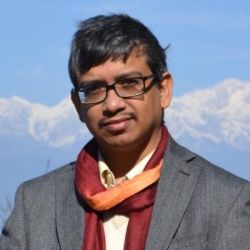
- Professor of Applied Mechanics
Dr. Gupta is a professor of Applied Mechanics at the Indian Institute of Technology, Madras. His research interests include nonlinear dynamics & stochastic nonlinear dynamics; stochastic modeling & uncertainty quantification; dynamics of complex networked systems; data science & machine learning in complex dynamical problems; structural reliability & life prediction system identification & structural health monitoring; fluid-structure interaction problems; and energy harvesting from dynamical systems.
Infodemiology, Social Networks, and Scientific Communication
Sudhir Prabhu Haladi

- Professor of Community Medicine
Currently serving as Professor and Head, Department of Community Medicine, Father Muller Medical College, Mangalore., Dr. Sudhir is also a community health physician having served at integrated positive preventive care clinic for PLHIV patients in Davangere as well as FSW clinic, MSM clinic and Orphan and vulnerable child care clinic. He is also currently involved in providing primary and secondary health care services at Ammunje outreach clinic, Jeppu Urban health centre and Bajpe rural hospital of Father Muller Medical College, Mangalore, India. He is also the National trainer on vaccine and cold chain (T-VaCC) course and National effective vaccine management (EVM) assessor and facilitator for National cold chain vaccine management resource centre, National institute of health and family welfare, Government of India with EVM assessment experience in more than 10 states of India. He is the Member Secretary of Association of public health technologists and Senior instructor for the Emergency care life support (ECLS) course of JeevRaksha, RGUHS involved in training doctors in handling medical emergencies in primary health care. He was actively involved in COVID-19 control activities in Dakshina Kannada district, being a member of COVID-19 surveillance, Rapid response team, Vaccine AEFI and Death audit committee. He also has special interests in research ethics and occupational health.
Epidemiology and Public Health, Infodemiology, Social Networks, and Scientific Communication, Education, Training, and Workforce Development, Surveillance & Contact Tracing, Computing & Data Infrastructure, and Privacy, Social, Behavioral, Economic, and Governance
Daikwon Han
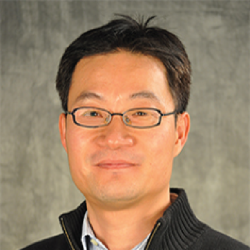
- Associate Professor of Epidemiology and Biostatistics
Dr. Han is an Associate Professor of Epidemiology & Biostatistics at Texas A&M School of Public Health. His research interests include Spatial Epidemiology; GIS & Spatial Analysis Methods; Environmental Health/Exposure Science; Environmental Justice & Health Disparities Healthcare Access; and Population Studies/Spatial Demography.
Epidemiology and Public Health, Social, Behavioral, Economic, and Governance
Govind Hariharan
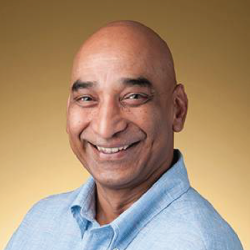
- Professor of Economics, Finance & Quantitative Analysis
Dr. Hariharan is a Professor of Economics, Finance, and Quantitative Analysis at Kennesaw State University, and his research interests include leadership in education, innovative program development, strategic partnerships, research and teaching expertise in individual behavior toward health and personal finance, and international business and economics of technology.
Epidemiology and Public Health, Infodemiology, Social Networks, and Scientific Communication, Social, Behavioral, Economic, and Governance
Xiaolei Huang

- Assistant Professor of Computer Science
Dr. Huang is an assistant professor at the University of Memphis. Xiaolei obtained his PhD in Information Science from the University of Colorado, Boulder. During his PhD, he was a visiting scholar at Johns Hopkins University. He did several internships in both academia and industry. He obtained his MSc and BEng degrees from the Chinese Academy of Sciences and Central China Normal University, respectively.
His research is in natural language processing and machine learning, with applications in public health. For example, he has developed surveillance models to understand vaccination and mental health issues via social media and built diagnosis systems for alcoholism. His current research interest is in domain adaptation, user modeling, and cross-lingual transfer learning.
Epidemiology and Public Health, Infodemiology, Social Networks, and Scientific Communication, Computational Biology and Bioinformatics, Surveillance & Contact Tracing, Computing & Data Infrastructure, and Privacy
Florence Hudson
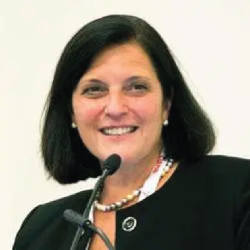
- Executive Director of the Northeast Big Data Innovation Hub
Florence Hudson is executive director of the Northeast Big Data Innovation Hub at Columbia University, and founder and CEO of FDHint, LLC, a global advanced technology and diversity and inclusion consulting firm. She is a former IBM vice president and chief technology officer, Internet2 senior vice president and chief innovation officer, special advisor for the NSF Cybersecurity Center of Excellence, and aerospace engineer at Grumman and NASA. She chairs the global IEEE/UL P2933 working group on Clinical IoT Data and Device Interoperability with TIPPSS – Trust, Identity, Privacy, Protection, Safety and Security, and has published books on TIPPSS. She serves on boards for Princeton University, Cal Poly San Luis Obispo, Stony Brook University, Blockchain in Healthcare Today, and the IEEE Engineering in Medicine and Biology Society. She has a B.S.E. in Mechanical and Aerospace Engineering from Princeton University, and executive business education from Harvard and Columbia universities.
Epidemiology and Public Health, Infodemiology, Social Networks, and Scientific Communication, Education, Training, and Workforce Development, Computational Biology and Bioinformatics, Surveillance & Contact Tracing, Computing & Data Infrastructure, and Privacy, Social, Behavioral, Economic, and Governance
Elizabeth Hunter
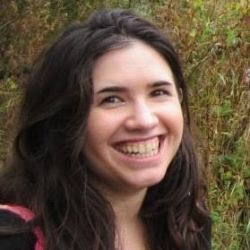
- Data Scientist
Epidemiology and Public Health
Rebecca Hutchins

- Principal Research Scientist
Epidemiology and Public Health
Constance Jeffery
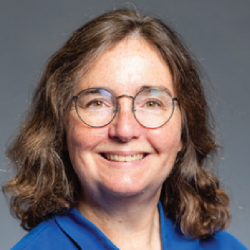
- Associate Professor of Biological Sciences
The genome projects yielded the sequences of tens of thousands of proteins. Elucidating the roles these proteins play in health and disease, and also how they can be used and/or modified for the development of novel therapeutics, biomaterials, biosensors, methods for energy production and methods for environmental remediation, will be aided by a better understanding of how a protein's amino acid sequence determines its structure and how structure determines function. The Jeffery lab's research on protein structure and function combines methods from biophysics (X-ray crystallography), biochemistry, and bioinformatics to address questions such as: how does an enzyme bind to its substrate and convert it to product? how do two similar proteins perform different functions? how do some proteins perform multiple, unrelated ‘moonlighting functions’? how can we find small molecules that disrupt functions in proteins in cancer and tuberculosis and that can serve as drug leads? and how do mutations in proteins associated with autoimmune disease affect the proteins’ structures and functions? In addition to research, Prof. Jeffery teaches upper level undergraduate biochemistry (Bios352/Chem352) and a first-year graduate course in molecular biology and biochemistry (Bios524).
(1) Analysis of protein sequences and structures to elucidate the connections between sequence, structure and function. This information might help in the future in developing better methods to predict a protein's function(s) from its sequence or structure. Two current projects in this area include an analysis of ligand binding sites in protein crystal structures and a study of the sequences and structures of "moonlighting proteins". Many protein functions can be inferred from the known functions of homologous proteins, but determining protein functions is complicated by an increasing number of "moonlighting proteins", proteins that have more than one function where the multiple functions are not a result of splice variants, gene fusions, or multiple isoforms (Jeffery, C. J. Moonlighting Proteins. (1999) Trends in Biochemical Sciences. 24: 8-11). We have created a database of the known moonlighting proteins (The MoonProt Database at moonlightingproteins.org) and are performing an analysis of their sequences and structures. Knowing more about moonlighting proteins could help in predicting which additional proteins might also have a second function, which would be useful in determining the function(s) of the thousands of proteins identified through the genome projects and the functions of the "unknown" proteins whose structures were solved as part of the Protein Structure Initiative. In addition, since the ability of proteins to moonlight can complicate interpretation of the results of proteomics projects, identifying the roles of proteins in disease, and the selection of biomarkers, understanding which proteins moonlight can be important for both basic research and medicine.
(2) The development of novel approaches to increase the expression of transmembrane proteins for biochemical analysis and structure determination. Membrane proteins play key roles in health and disease and are the targets of the majority of pharmaceuticals in use today, but much less is known about their structures and mechanisms of function than for soluble proteins because of the challenges in their expression, purification, and structure determination. The goal of our new approaches is to alleviate the bottleneck in protein expression.
(3) In a previous project, we elucidated the reaction mechanism of a glycolytic enzyme that moonlights as a tumor cell motility factor in breast cancer cells: phosphoglucose isomerase/autocrine motility factor (PGI/AMF). By solving six structures of PGI/AMF with different ligands bound, we developed a model of the multistep catalytic mechanism for this multifunctional enzyme/growth factor.
Education, Training, and Workforce Development, Computational Biology and Bioinformatics
Branden Johnson
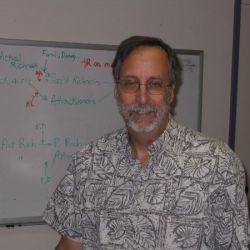
- Senior Research Scientist
Dr. Johnson's main focus has been basic and applied research in academia (U. Pittsburgh, Michigan Technological U.), government (New Jersey Dept. of Environmental Protection), and the non-profit sector (Decision Research), but he has also worked as a regulator of drinking water safety (NJDEP). Although the bulk of his research has concerned environmental issues (water, air pollution, radioactive waste, black bears, wetlands, etc.), he has also worked on terrorism, food safety, and cancer clusters, among other topics, and am willing to study other technological, natural and social hazards. His work as a social scientist has involved extensive collaboration with natural scientists and engineers as well as other behavioral and social scientists, and with partners from academia, government, business, nonprofit, and activist organizations, and he is open to new research collaborations. His specialties are in risk perception and risk communication; environmental policy; hazard management; and qualitative and quantitative research methods.
Effective public health communication requires a good understanding of what audiences (and communicators) need to know about the topic, yet measures of "objective knowledge" that cover all potential issues but can be tailored to the specific pandemic of the moment are not available. He is looking for a multi-disciplinary team of natural, social, and public health scientists who would like to seek funding for developing, testing, and making publicly available a suite of valid and reliable measures that could be used in future efforts to identify knowledge gaps, and track efficacy of communication efforts, as well as inform the better design in advance of those communications.
He has conducted three longitudinal surveys to study the dynamics of Ebola, Zika, and COVID-19 views (e.g., risk perceptions; policy support) and behaviors, and their antecedent factors, among mainland U.S. samples, and learned a great deal about how to improve those designs. However, he feels even more could be accomplished with a broader team, and invites interested parties to collaborate on developing, and seeking funding for, an improved approach to encourage more use of this useful but challenging longitudinal approach. At minimum, he hopes to seek to develop a template that could be made available as a public resource for the next generation of researchers, and for international researchers with fewer resources; he also could propose that funding be made available for that purpose as well as underwrite timely data collection at the next pandemic to illustrate its benefits while addressing public health needs. He's open to social scientists from varied disciplines, as the character of this effort would depend upon who is involved.
Social, Behavioral, Economic, and Governance
Mathan Karuppiah
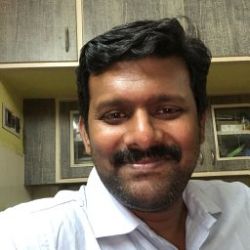
- Consultant Epidemiologist
Dr. Karuppiah is a radiologist and epidemiologist at G. Kuppuswamy Naidu Memorial Hospital. He has more than 10 years of experience in ultrasonography and 3 years of experience as an epidemiologist. His research focuses on causal inference frameworks for RWE.
Epidemiology and Public Health, Surveillance & Contact Tracing, Computing & Data Infrastructure, and Privacy
Hamdi Kavak
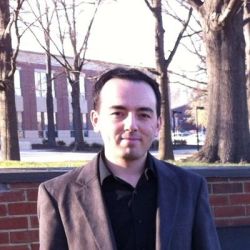
- Assistant Professor of Computational and Data Sciences
- Co-Director of the Center for Social Complexity
Dr. Kavak is an Assistant Professor at the Department of Computational and Data Sciences and Co-Director of the Center for Social Complexity at George Mason University (GMU). He holds a Ph.D. degree and a Master’s degree in Modeling and Simulation from Old Dominion University, and a B.Sc. degree in Computer Engineering from Karadeniz Technical University in Turkey.
His research contributes to the intersection of simulation modeling and data science by using data mining and machine learning techniques to uncover behavioral patterns from publicly available data. This fertile research area lends itself very well to the Computational Social Science (CSS) and Computational Sciences and Informatics (CSI) fields. Therefore, he advises and works with students from both CSS and CSI programs at GMU. Being a method-oriented person, he applies my research to many domains, particularly cybersecurity and urban science.
Epidemiology and Public Health, Surveillance & Contact Tracing, Computing & Data Infrastructure, and Privacy, Social, Behavioral, Economic, and Governance
Simon Levin

- James S. McDonnell Distinguished University Professor in Ecology and Evolutionary Biology
Simon A. Levin received his B.A. from Johns Hopkins University and his Ph.D. in Mathematics from the University of Maryland. At Cornell University 1965-1992, he was Chair of the Section of Ecology and Systematics, and then Director of the Ecosystems Research Center, the Center for Environmental Research and the Program on Theoretical and Computational Biology, as well as Charles A. Alexander Professor of Biological Sciences (1985-1992). Since 1992, he has been at Princeton University where he is currently James S. McDonnell Distinguished University Professor in Ecology and Evolutionary Biology and Director of the Center for BioComplexity. He retains an Adjunct Professorship at Cornell, where he still has many valued colleagues, was a Distinguished Visiting Professor at UC Irvine from 2007-2016. He is currently a Distinguished Visiting Professor at Arizona State University.
His research interests are in understanding how macroscopic patterns and processes are maintained at the level of ecosystems and the biosphere, in terms of ecological and evolutionary mechanisms that operate primarily at the level of organisms; in infectious diseases; and in the interface between basic and applied ecology.
Levin is a Fellow of the American Academy of Arts and Sciences and the American Association for the Advancement of Science, a Member of the National Academy of Sciences and the American Philosophical Society, and a Foreign Member of the Istituto Veneto and the Istituto Lombardo. He is a University Fellow of Resources for the Future, a Fellow of the Beijer Institute of Ecological Economics, a Fellow of the Society for Industrial and Applied Mathematics, a Fellow of the Society for Mathematical Biology, a Fellow of the American Mathematical Association, a Distinguished Fellow of the Luohan Academy, and a Fellow of the Academia Europaea. He also has received honorary doctorates from Eastern Michigan University, Whittier College, Michigan State University, McMaster University, and the University of Victoria. He chaired the Governing Council for IIASA for more than five years and was Vice-Chair from 2009-2012. He has served on the Science Board of the Santa Fe Institute, which he co-chaired from 2007-2010. He is also Vice-Chair for Mathematics of the Committee of Concerned Scientists. Levin is a former President of the Ecological Society of America and the Society for Mathematical Biology, and a past Chair of the Board of the Beijer Institute of Ecological Economics.
He won the MacArthur Award (1988), Distinguished Service Citation (1998) and the Eminent Ecologist Award (2010) of the Ecological Society of America, the Okubo Award of the Society for Mathematical Biology and the Japanese Society for Theoretical Biology, and the Distinguished Scientist Award of the American Institute for Biological Sciences. He was honored with the Dr. A.H. Heineken Prize for Environmental Sciences by the Royal Netherlands Academy of Arts and Sciences (2004), the Kyoto Prize in Basic Sciences (2005) by the Inamori Foundation, and the Margalef Prize (2010) of the Government of Catalonia, the Luca Pacioli Prize from Ca’Foscari University of Venice, Italy, the Tyler Prize for Environmental Achievement (2014), the National Medal of Science (2014, announced 2015, awarded 2016), and the BBVA Foundation Frontiers of Knowledge Award in Ecology and Conservation Biology (2022).
Levin has mentored more than 100 graduate students and postdoctoral fellows and has published widely. He is the editor of the influential Princeton Guide to Ecology and the landmark Encyclopedia of Biodiversity.
Epidemiology and Public Health, Education, Training, and Workforce Development, Computational Biology and Bioinformatics, Social, Behavioral, Economic, and Governance
Ninghui Li
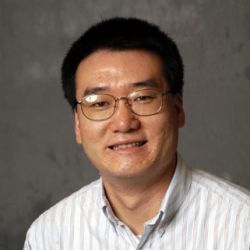
- Samuel D. Conte Professor of Computer Science
Ninghui Li is a Professor of Computer Science at Purdue University. He has been doing research in security and privacy, including data privacy, applied cryptography, access control, trust management, and human factors in security and privacy. He has published over 150 referred papers in these areas. His 2007 paper ``t-Closeness: Privacy Beyond k-Anonymity and l-Diversity'' recently received the ICDE 2017 Influential Paper award.
Prof. Li was elected Chair of the ACM Special Interest Group on Security, Audit, and Control (SIGSAC) in 2017. From 2013 to 2017, he served as SIGSAC's Vice Chair. He is on the editorial boards of ACM Transactions on Privacy and Security (TOPS), Journal of Computer Security (JCS), and ACM Transactions on Internet Technology (TOIT); and was on the editorial board of IEEE Transactions on Dependable and Secure Computing (TDSC) from 2011 to 2015 and the VLDB Journal from 2007 to 2013.
Prof. Li has served on the Program Committees of over 150 international conferences and workshops in computer security, databases, and data mining. In 2014 and 2015, he served as the Program Chair for the ACM Conference on Computer and Communications Security (CCS), ACM's flagship conference in the field of security and privacy.
Prof. Li's research has been supported by multiple NSF grants, including an NSF CAREER award in 2005. His research has also been supported by the Air Force Office of Scientific Research (AFOSR), Army Research Office (ARO), National Security Agency (NSA), IBM Research, Google, and Samsung. He collaborated with Dr. Bertino on NSF and AFOSR-funded projects.
Computational Biology and Bioinformatics, Surveillance & Contact Tracing, Computing & Data Infrastructure, and Privacy
Julie Liao
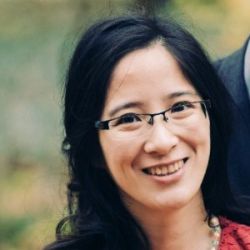
- Director of the Forum of Microbial Threats
Dr. Liao is a molecular microbiologist with experience in high-throughput antimicrobial discovery, vaccine development, and bacterial biofilm. She is currently the director of the Forum on Microbial Threats at the National Academies of Sciences, Engineering, and Medicine.
Epidemiology and Public Health
Yuhong Liu
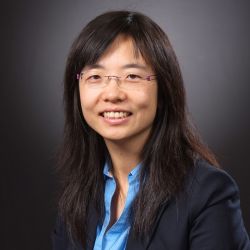
- Associate Professor of Computer Engineering
Dr. Liu is an Associate Professor in the Department of Computer Engineering at Santa Clara University, received her B.S. and M.S. degrees from Beijing University of Posts and Telecommunications in 2004 and 2007 respectively, and her Ph.D. degree from the University of Rhode Island in 2012 under the supervision of Dr. Yan (Lindsay) Sun. She is the recipient of the 2019 Researcher of the Year Award at School of Engineering, Santa Clara University, and the 2013 University of Rhode Island Graduate School Excellence in Doctoral Research Award. Her research interests include trustworthy computing and cyber security of emerging applications, such as Internet-of-things, blockchain, and online social media. She has published over 60 papers in prestigious journals and peer-reviewed conferences. Her papers have been selected as the best paper at the IEEE International Conference on Social Computing 2010 (acceptance rate = 13%) and the 9th International Conference on Ubi-Media Computing (UMEDIA 2016).
She is actively contributing to professional societies including IEEE and APSIPA. She is a senior member of IEEE, and currently serving as the Chair of IEEE Computer Society STC Executive Committee Board, the Chair of the IEEE Computer Society Technical Meeting Request Committee, and IEEE Computer Society Distinguished Visitor(2021~2022). She has also served as an APSIPA Distinguish Lecturer, the secretary of the APSIPA U.S. Chapter, and a member of the Multimedia Security and Forensics (MSF) TC for Asia-Pacific Signal and Information Processing Association (APSIPA).
Infodemiology, Social Networks, and Scientific Communication, Surveillance & Contact Tracing, Computing & Data Infrastructure, and Privacy, Social, Behavioral, Economic, and Governance
David Mantilla

- Postdoctoral Associate
David Mantilla-Calderon is a postdoctoral associate at WashU. He received his Ph.D. in Bioscience from the King Abdullah University of Science and Technology (KAUST) in Saudi Arabia. David's research interest lies in understanding how environmental pollutants could alter microbial communities. Prior to his postdoctoral research at Washington University, David investigated the link between mutagenic stress and horizontal gene transfer rates in environmental bacteria.
Epidemiology and Public Health, Computational Biology and Bioinformatics
Madhav Marathe
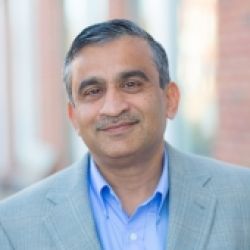
- Professor of Computer Science
Madhav Marathe is an endowed Distinguished Professor in Biocomplexity, Director of the Network Systems Science and Advanced Computing (NSSAC) Division, Biocomplexity Institute and Initiative, and a tenured Professor of Computer Science at the University of Virginia. Dr. Marathe is a passionate advocate and practitioner of transdisciplinary team science. During his 25-year professional career, he has established and led a number of large transdisciplinary projects and groups. His areas of expertise are network science, artificial intelligence, multi-agent systems, high-performance computing, computational epidemiology, biological and socially coupled systems, and data analytics.
His prior positions include Professor of Computer Science and Director of the Network Dynamics and Simulation Science Laboratory within the Biocomplexity Institute of Virginia Tech and a team leader of research and computing in the Basic and Applied Simulation Science group, Computer and Computational Sciences Division at the Los Alamos National Laboratory. He is a Fellow of the American Association for the Advancement of Science (AAAS), Society for Industrial and Applied Mathematics (SIAM), Association for Computing Machinery (ACM), and Institute of Electrical and Electronics Engineers (IEEE). Dr. Marathe has published more than 500 articles in peer-reviewed journals, conferences, and workshops. Mentoring and training next-generation scientists has been his life-long passion. He has mentored more than a dozen staff scientists, and (co)-advised more than 30 doctoral students, 20+ MS students, and 15 postdoctoral fellows.
Dr. Marathe and his division focus on developing the scientific foundations and the associated engineering principles to study large-scale biological, information, social, and technical (BIST) systems. His current interests span five broad themes: (i) methods to construct various BIST networks using partial and noisy data as well as procedural information; (ii) understanding the general form and structure of dynamical processes over BIST networks (e.g., key network/pathway properties and typical pathways that impact dynamics); (iii) algorithmic theory of optimization and control as it pertains to the dynamical processes, including methods to detect, enhance, arrest, and mitigate dynamics; (iv) general conceptual and algorithmic foundations to understand the co-evolution of the networks and dynamics; and (v) high-performance services-based computing solutions that can be delivered seamlessly to end users and policymakers.
Epidemiology and Public Health, Infodemiology, Social Networks, and Scientific Communication, Computational Biology and Bioinformatics, Surveillance & Contact Tracing, Computing & Data Infrastructure, and Privacy, Social, Behavioral, Economic, and Governance
Wilfred Ndifon
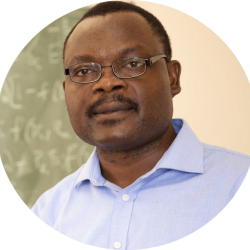
- Chief Scientific Officer
Dr. Ndifon is a Professor of Theoretical Biology at AIMS and the AIMS Network’s Research Director.
He applies mathematical thinking and modeling to discover mechanistic insights about diverse phenomena relevant to adaptive immunity. He has thus advanced the mechanistic understanding of, among others, the formation of T cell receptors via genetic recombination; the collapse of T cell diversity in the elderly; immune evasion by influenza viruses; the original antigenic sin; and hemagglutination-inhibition. He's also interested in theory-driven machine learning as an aid to inductive inference and prediction in biology and medicine; quantization of health; and phenotype accessibility in evolutionary landscapes and investigates translational applications of insights obtained from basic scientific work.
He spent several years at Princeton University studying theoretical biology with Simon Levin, graduating with Master’s (Sep 2005 – Jun 2007) and PhD (Feb 2008 – Apr 2009) degrees. Before then, he obtained a Bachelor’s degree in Biology from Morgan State University and then spent one and a half years doing independent research on RNA folding dynamics and other topics while developing commercial software as a hobby.
Mark Orr
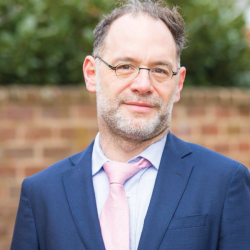
- Research Associate Professor of the Biocomplexity Institute
Mark Orr is a research associate professor in the Network Systems Science and Advanced Computing division. Orr was originally trained as a cognitive psychologist at the University of Illinois at Chicago. Orr received augmentation to this training with postdoctoral fellowships in computational modeling (Carnegie Mellon), neuroscience (Albert Einstein College of Medicine), and epidemiology/complex systems (Columbia University). Over the past decade, he has become heavily involved in understanding dynamic processes and drivers of risky behavior and decision-making, primarily in a public health context, at the scale of the individual and populations. Orr is now currently expanding these ideas into other contexts and for other applications (e.g., DoD, DOE, DHS).
Epidemiology and Public Health, Infodemiology, Social Networks, and Scientific Communication, Social, Behavioral, Economic, and Governance
Philip E. Paré
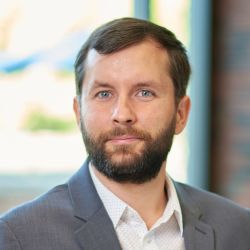
- Rita Lane and Norma Fries Assistant Professor of Electrical and Computer Engineering
Dr. Paré is the Rita Lane and Norma Fries Assistant Professor at the Elmore Family School of Electrical and Computer Engineering at Purdue University. He is a member of the Center for Innovation in Control, Optimization, and Networks (ICON) and is affiliated with the Integrative Data Science Initiative (IDSI) and the Center for Education and Research in Information Assurance and Security (CERIAS). He is also a member of the PIECE (Project for Inclusion in ECE) Committee.
He is interested in bridging the gap between mathematical models and control of epidemic processes over networks (my expertise) and practice. He is always interested in finding more collaborators on the applied/epidemiological/public health side that want to help build that bridge.
Epidemiology and Public Health, Infodemiology, Social Networks, and Scientific Communication, Surveillance & Contact Tracing, Computing & Data Infrastructure, and Privacy, Social, Behavioral, Economic, and Governance
H. Vincent Poor

- Michael Henry Strater University Professor of Electrical and Computer Engineering
Dr. Poor's current research is focused on advances in several fields of rapid technology development, notably wireless networks, and energy systems, and on the fundamentals underlying them, including information theory, machine learning, and network science.
The dramatic increase in demand for new capacity and higher performance has been a major issue in the design and deployment of contemporary wireless networks. The development of these capabilities is severely limited by the scarcity of two of the principal resources in wireless networks: energy and bandwidth. Emerging generations of wireless standards and applications such as the Internet of Things (IoT) are addressing these issues through the use of techniques such as cooperative communications, spectrum sharing, energy harvesting, cloud processing, and densification of infrastructure. One focus of our recent work has addressed the fundamental limits of such techniques through information-theoretic and related analyses of high-reliability and low-latency communications. Another focus has been on addressing the fundamental ability of the physics of the radio channel to provide security in data transmission, and the development of codes and other methods to exploit this capability. A further issue that we are exploring is the use of wireless networks as platforms for machine learning, through the development of federated and decentralized learning algorithms and the study of their interactions with the wireless medium.
His lab's work in energy systems has focused on the smart grid, which has emerged as a key technology for improving the efficiency, efficacy, and security of the distribution and consumption of electric power, particularly for the integration of renewable energy sources such as wind and solar power into the electricity grid. His lab's work in this area has focused on the use of advanced methods from communications and information technology to address several issues arising in this context, including the detection and amelioration of bad data and physical attacks on the grid, the study of privacy issues for both operators and consumers, the characterization of grid resilience through topological data analysis, the development of distributed algorithms for state estimation and control of the grid, and the use of game theory and prospect theory to develop an understanding of the behavior of grid participants in activities such peer-to-peer energy trading.
His lab is also working currently on improved modeling of the spread of COVID-19, and the development of optimal and robust control mechanisms for this spread.
Epidemiology and Public Health, Computational Biology and Bioinformatics, Surveillance & Contact Tracing, Computing & Data Infrastructure, and Privacy
William H. Press
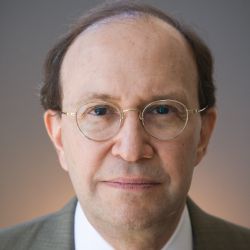
- Professor of Computer Science and Integrative Biology
William H. Press is a computer scientist and computational biologist with broad interests in the physical and biological sciences. An experienced manager in both university and national laboratory settings, he is widely recognized for his academic and research accomplishments.
Press is the Leslie Surginer Professor of Computer Science and Integrative Biology at the University of Texas at Austin. At UT, his affiliations include membership in the Oden Institute for Computational Engineering and Sciences and in the Institute for Cellular and Molecular Biology. Press is also a Senior Fellow (emeritus) at the Los Alamos National Laboratory. From 2009 to 2017, Press was a member of President Obama's Council of Advisors on Science and Technology (PCAST). He is a past (2012-2013) president of the American Association for the Advancement of Science. He is currently the elected Treasurer of the National Academy of Sciences and is a member of the Governing Board of the National Research Council.
In his research career, Press has published more than 160 papers in the areas of computational biology, theoretical astrophysics, cosmology, and computational algorithms. He is the senior author of the Numerical Recipes textbooks on scientific computing, with more than 400,000 hardcover copies in print. Elected to the National Academy of Sciences (NAS) in 1994, he became a founding member of NAS's Computer and Information Sciences section in 2000.
Press was for more than two decades Professor of Astronomy and of Physics at Harvard University, during which he served as Department Chair and in various other positions of university service. Earlier, he was an Assistant Professor of Physics at Princeton University, and Richard Chace Tolman Research Fellow in Theoretical Physics at Caltech, where he received his Ph.D. in physics in 1972. His undergraduate degree was from Harvard in 1969.
Press' research lies at the interface between computer science and computational biology. Recent work includes the development of an error-correcting code (ECC) for massive data storage in engineered DNA. Press and his students collaborate with the lab of Professor Ilya Finkelstein on platforms for massively parallel experiments on DNA-protein binding.
Ramesh Raskar

- Associate Professor of Media Arts and Sciences
- NEC Career Development Professor
Ramesh Raskar is the Associate Director of MIT Media Lab, Assoc. Prof. at MIT and director of the Camera Culture group at MIT Media Lab.
At MIT, his co-inventions include a Camera to see around corners, femto-photography, automated machine learning (auto-ML), private ML (split-learning), low-cost eye care devices (Netra, Catra, EyeSelfie), a novel CAT-Scan machine, motion capture (Prakash), long-distance barcodes (Bokode), 3D interaction displays (BiDi screen), new theoretical models to augment light fields (ALF) to represent wave phenomena and algebraic rank constraints for 3D displays(HR3D).
In his recent role at Facebook, he launched and led innovation teams in Digital Health, Health-tech, Satellite Imaging, TV bandwidth for Connectivity, VR/AR and the 'Emerging Worlds' initiative for FB. His new focus is on building world-scale interfaces between societal systems and cyber-physical systems. They span research in physical (e.g., sensors, health-tech), digital (e.g., automating machine learning), and global (e.g., geomaps, autonomous mobility) domains.
He received the Lemelson Award 2016, ACM SIGGRAPH Achievement Award 2017, Technology Review TR100 Award 2004, Global Indus Technovator Award, top 20 Indian Technology Innovators Worldwide 2003, Alfred P. Sloan Research Fellowship Award 2009 and DARPA Young Faculty Award 2010. Others include the Marr Prize honorable mention 2009, LAUNCH Health Innovation Award, presented by NASA, USAID, US State Dept+ NIKE, 2010, Vodafone WirelessInnovationAward (first place) 2011. He has received four Mitsubishi Electric Invention Awards. His work has appeared in the NYTimes, WSJ, CNN, BBC, NewScientist, TechnologyReview, etc. He holds 125+ US patents.
Rahul Roy
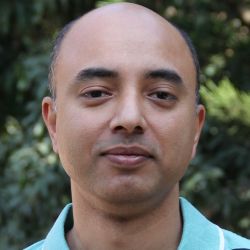
- Associate Professor of Chemical Engineering
Dr. Roy is an Associate Professor of Chemical Engineering at the Indian Institute of Science, Bangalore, India. His lab leads an interdisciplinary research program that aims to innovate and engineer technologies to help understand this basic question. They primarily focus on long-standing questions in infectious diseases caused by positive-strand RNA viruses and pathogenic bacteria using single molecule detection, quantitative genomics, and high-resolution imaging.
Epidemiology and Public Health, Computational Biology and Bioinformatics
Davida Smyth
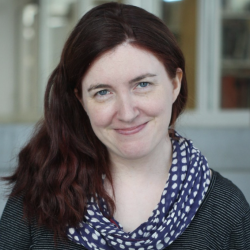
- Associate Professor of Microbiology
Davida S. Smyth received her Ph.D. in Microbiology from the University of Dublin, Trinity College, Ireland, and completed her postdoctoral training at New York Medical College, the University of Mississippi Medical Center, and New York University. She has served as Associate Professor and Chairperson of the Department of Natural Sciences in Mercy College’s School of Health and Natural Sciences. There she taught environmental science, introductory biology, microbiology, and genetics and developed classroom-based research experiences in microbial genomics. Previously, she was an Assistant Research Scientist in Richard Novick's lab at NYU Langone Medical Center, was an Adjunct Lecturer for the online Masters in Bioinformatics program at NYU Tandon School of Engineering, and an Assistant Professor of Biology at New York City College of Technology (NYCCT). Her research focus is on the field of microbial epidemiology and genomics and she has more than 20 original articles in peer-reviewed journals. She is an Associate Editor for BMC Infectious Diseases and Frontiers in Microbiology. She is an external committee member for Mercy College's Adjunct Academy component of their Inclusive Excellence Project and Peer-Led Team Learning Program for Biology, Chemistry, and Psychology students. In 2019, she was invited to the steering committee of the Research Experiences in Microbiomes Network (REMNet) of CUNY and became a Co-PI in 2020. At the New School, she directed the Biosafety Level 2 research lab. She developed several new courses that involve undergraduates in research and incorporate civic engagement and social justice into the curriculum. Her freshman seminar "How the Toilet Changed the World" taught students about the role and impact of sanitation on our society and about the ongoing and future challenges associated with both access to toilets and sustainable toilet design. Her "Microbial Ecologies" course taught students about the importance of microbes in our world and how we need to protect and preserve microbial diversity for planetary health. Students also participated in Tiny Earth, searching for novel antibiotic-producing microbes from the NYC urban soil and water environments. Her "Evolution, Mutation and Computation" class exposed students to coded lifeforms "avidians" and students performed experiments on a digital platform called Avida-Ed. Her "Microbiome of Urban Spaces" course involved students in studying the microbiome of our built spaces. Students chose their own research site and studied it using next-generation sequencing technology and an iSeq sequencer. Dr. Smyth also mentored students as part of the Urban Barcode Research Program of Cold Spring Harbor Labs. In 2020 she was awarded funding from the NYC DEP and the National Science Foundation to study microbial transmission on the New School campus.\
She is devoted to undergraduate research and her students have presented their work at several national and international meetings including the Annual Biomedical Research Conference for Minority Students (ABRCMS), and the American Society for Microbiology (ASM) annual conference. With her undergraduate team, she researches the role of the built environment and anthropogenic activity in driving antibiotic resistance, a major global health threat. She also engages in pedagogical research on improving civic and scientific literacy in biology and integrating authentic research into the curriculum to improve student engagement and success in science. Dr. Smyth also guides and mentors future faculty and adjuncts to successfully apply for academic positions in teaching and beyond. Since 2014, she has been involved with SENCER (Science Education for New Civic Engagements and Responsibilities) and was appointed a SENCER Senior Leadership Fellow in 2018. She was awarded the Mercy College Excellence in Teaching Award in 2018. In 2019 she became a PULSE Fellow. In 2020, she was appointed Deputy Director of the National Center for Science and Civic Engagement. In 2021 she was awarded the Faculty Excellence in Advising award from The New School. In 2022, she received the Four Year College and University Section Biology Teaching Award from the National Association of Biology Teachers.
Epidemiology and Public Health, Infodemiology, Social Networks, and Scientific Communication, Education, Training, and Workforce Development, Surveillance & Contact Tracing, Computing & Data Infrastructure, and Privacy
Shabnam Sodagari
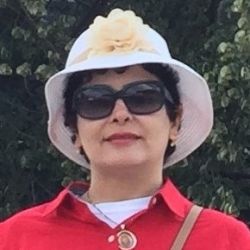
- Associate Professor of Computer Engineering and Computer Science
Dr. Shabnam Sodagari is an associate professor of Computer Engineering and Computer Science (CECS). She received her PhD degree from Penn State (Pennsylvania State University). Her current research interests include data analytic-centered and machine learning-based robust IoT healthcare systems, dynamic spectrum access, and secure next-generation communications. Her expertise further includes providing consultation to Academic Affairs in support of the CSU Chancellor's Office initiatives. She is a senior member of the IEEE and has several publications in impactful journals and flagship conferences.
Epidemiology and Public Health, Education, Training, and Workforce Development, Surveillance & Contact Tracing, Computing & Data Infrastructure, and Privacy
Milind Tambe
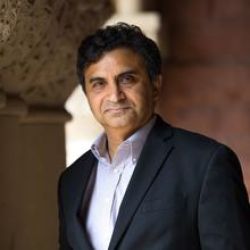
- Gordon McKay Professor of Computer Science
- Director of the Center for Research in Computation and Society (CRCS)
Milind Tambe is the Gordon McKay Professor of Computer Science and Director of the Center for Research in Computation and Society at Harvard University; concurrently, he is also Principal Scientist and Director for "AI for Social Good" at Google Research. He is recipient of the IJCAI (International Joint Conference on AI) John McCarthy Award, AAAI (Association for Advancement of AI) Feigenbaum Prize, AAAI Robert S. Engelmore Memorial Lecture Award, AAMAS ACM (Association for Computing Machinery) Autonomous Agents Research Award, INFORMS (Institute for Operations Research and the Management Sciences) Wagner prize for excellence in Operations Research practice and MORS (Military Operations Research Society) Rist Prize. He is a fellow of AAAI and ACM. For his work on AI and public safety, he has received the Columbus Fellowship Foundation Homeland Security award and commendations and certificates of appreciation from the US Coast Guard, the Federal Air Marshals Service, and airport police in the city of Los Angeles.
Prof. Tambe's other prior awards include the Okawa Foundation award, RoboCup Scientific Challenge award, and the IBM faculty award. Additionally, Prof. Tambe and coauthors have received 17 best paper awards at conferences such as AAAI, AAMAS, IJCAI, and others; this includes his 1997 paper "Towards flexible teamwork" in the Journal of AI Research that won the AAMAS influential paper award (an award given out 10 years after the publication of a paper).
Prior to Harvard, Prof. Tambe was the Helen N and Emmett H Jones Professor in Engineering at the University of Southern California (USC), where he co-founded the Center for AI in Society (CAIS) [2016], one of the first centers in the country focused on AI for social impact. At USC, he was awarded the USC associates award for creativity in research, "the highest honors the university faculty can bestow on its members for distinguished intellectual and artistic achievements", the inaugural USC Viterbi School of Engineering Use-inspired research award, and the Steven B. Sample teaching and mentoring award "only faculty recognition award that is initiated by USC parents and family members".
Prof. Tambe completed his PhD from the School of Computer Science at Carnegie Mellon University. Prior to that, he completed his undergraduate education at BITS, Pilani, India, where he was awarded the Distinguished Alumnus Award.
Franklin Tchakounté
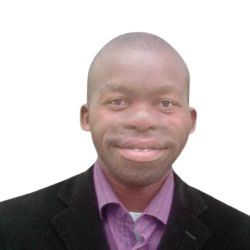
- Associate Professor of Maths and Computer Science
- Chief Executive Officer at CyCOMAI
Professor Tchakounté Franklin is an Associate Professor and researcher in computer science with more than 10 years of experience in cybersecurity and data science with a strong background in distributed systems. He received his MSc in Computer engineering from the University of Ngaoundéré (Cameroon, 2010) and his PhD Engineering Degree in Mobile Security from the University of Bremen (Germany, 2015). He has certifications in networks (CCNA, LPI, Suse), Cybersecurity (IBM), and Digital transformation (Coursera). He authored books, book chapters, and several research papers in the area of cyber security.
Prof Franklin is the founder of the Cybersecurity with Computational and Artificial Intelligence (CyComAI) company. He has been involved in international projects as a leader, assistant scientist, and technologist. He is a fellow of the German Academic Exchange Service (DAAD) Staff Exchange in Sub-Saharan Africa, Research Mobility grants in the Ministry of Higher Education in Cameroon, and the WebWeWant F.A.S.T project. Devoted to volunteering in reviewing and conference involvement, he is currently a (senior) member of the European Alliance for Innovation (EAI), ISOC SIG Cybersecurity, and ISO SIG Cybersecurity Training and Education. He is presently the Cameroonian representative of Responsibility in AI in Africa (RAIN-Africa) and his interests include cyber security and artificial intelligence. For now, he proposes strategies for digital governance and transformations and is active in designing responsible AI security tools relying on the collective intelligence from social technologies around people.
Education, Training, and Workforce Development, Surveillance & Contact Tracing, Computing & Data Infrastructure, and Privacy, Social, Behavioral, Economic, and Governance
Moshe Vardi
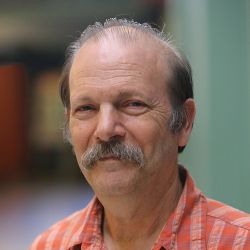
- Karen Ostrum George Distinguished Service Professor in Computational Engineering University Professor
Moshe Y. Vardi is a University Professor and the George Distinguished Service Professor in Computational Engineering at Rice University. He is the recipient of three IBM Outstanding Innovation Awards, the ACM SIGACT Goedel Prize, the ACM Kanellakis Award, the ACM SIGMOD Codd Award, the Blaise Pascal Medal, the IEEE Computer Society Goode Award, the EATCS Distinguished Achievements Award, the Southeastern Universities Research Association's Distinguished Scientist Award, the ACM SIGLOG Church Award, the Knuth Prize, and the ACM Allen Newell Award.
He is the author and co-author of over 600 papers, as well as two books: Reasoning about Knowledge and Finite Model Theory and Its Applications. He is a Fellow of the American Association for the Advancement of Science, the American Mathematical Society the Association for Computing Machinery, the American Association for Artificial Intelligence, the European Association for Theoretical Computer Science, the Institute for Electrical and Electronic Engineers, and the Society for Industrial and Applied Mathematics. He is a member of the US National Academy of Engineering and National Academy of Science, the American Academy of Arts and Science, the European Academy of Science, and Academia Europaea.
He holds seven honorary doctorates. He is currently a Senior Editor of the Communications of the ACM, after having served for a decade as Editor-in-Chief.
Vítor V. Vasconcelos

- Assistant Professor of the Informatics Institute
In this era of Complexity, Dr. Vasconcelos seeks to explore the emergent properties of complex systems and their interconnectedness. From climate change to global misinformation, our collective inability to manage these systems results in a multitude of systemic crises.
He employs a variety of mathematical and computational methods, coupled with experiments and observations, and delves into the intricacies of systems involving humans, resources, and governing institutions. His ultimate aim is to utilize this knowledge to address some of society’s most pressing problems.
He is an Assistant Professor at the University of Amsterdam, working at the Computational Science Lab at the Informatics Institute (IvI), collaborating with a great team locally and many great fellows around the world. He co-leads the Polder initiative at the Institute of Advanced Studies and coordinates the development of a new Master’s program in Complex Systems and Policy at the Institute for Interdisciplinary Studies.
Previously, he was a Visiting Research Scholar at the Andlinger Center for Energy and the Environment and the Princeton Institute for International and Regional Studies, at Princeton University, where he also did two postdocs. He finished his Ph.D. in Sciences at the University of Minho, in Portugal, in 2017.
Infodemiology, Social Networks, and Scientific Communication, Social, Behavioral, Economic, and Governance
Anil Vullikanti

- Professor of Computer Science
Anil Kumar S. Vullikanti is a professor in the Department of Computer Science and at the Biocomplexity Institute. Vullikanti received his undergraduate degree from the Indian Institute of Technology, Kanpur, and his Ph.D. from the Indian Institute of Science, Bangalore. He was a post-doctoral researcher at the Max-Planck Institute for Informatics and a technical staff member at the Los Alamos National Laboratory.
Vullikanti's research interests are in the broad areas of approximation and randomized algorithms, dynamical systems, wireless networks, social networks, computation epidemiology, and the modeling, simulation, and analysis of socio-technical systems. His work has been published in journals and conferences in different areas, such as Nature, Journal of the ACM, IEEE/ACM Transactions on Networking, and the SIAM Journal on Computing and Transactions on Parallel and Distributed Computing. Vullikanti’s name appears as V.S. Anil Kumar in most publications. He is the recipient of the NSF CAREER award and the DOE Early Career award.
May D. Wang
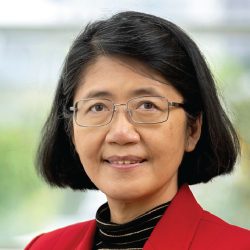
- Professor of Biomedical Engineering
Dr. May Dongmei Wang is Wallace H. Coulter Distinguished Faculty Fellow and full professor in BME and ECE at Georgia Institute of Technology (GT) and Emory University (EU). Her research is in Biomedical Big Data with AI-Driven Intelligent Reality for predictive, personalized, and precision health (pHealth). She has 20+ years academic professorship and ~4 years industrial experience. She published 260+ peer-reviewed articles in referred journals and conference proceedings with ~13,600 Google Scholar citations, and delivered 250+ invited and keynote lectures.
Dr. Wang is the Director of Biomedical Big Data Initiative, a Georgia Distinguished Cancer Scholar, a Petit Institute Faculty Fellow, a Kavli Fellow, a AIMBE Fellow, an IAMBE Fellow, an IEEE Fellow, and a member of Board of Directors in American Board of AI in Medicine (ABAIM).
Dr. Wang is the Senior Editor for IEEE Journal of Biomedical & Health Informatics (J-BHI), an Associate Editor for IEEE Transactions for BME, and IEEE Reviews for BME, a regular panelist for NIH CDMA (Clinical Data Management and Analysis) study section, NSF Smart and Connect Health, Brain Canada, and multiple European countries. She co-organizes IEEE Healthcare Summit on Integrating BHI and AI to Combat Pandemics, and IEEE-JBHI Special Issue on AI-driven Informatics, Sensing, Imaging and Big Data Analytics for Fighting the COVID-19 Pandemic. Dr. Wang grows Biomedical and Health Informatics communities over 12 years. In 2022, Dr. Wang serves in IEEE Future Directions Committee. In 2021, she is elected to International Academy of Medical and Biological Engineering (IAMBE) Executive Committee. She serves as Chair for IEEE Biomedical and Health Informatics Technical Committee, and ACM Special Interest Group in Bioinformatics. During 2018-2020, she was Carol Ann and David Flanagan Distinguished Faculty Fellow at GT. During 2023-2024 and 2017-2019, she was elected IEEE-Engineering in Medicine and Biology Society Vice President.
In 2021-2022, Dr. Wang is selected into Georgia Tech Provost Emerging Leaders Program. During 2015-2017, she was GT Biomedical Informatics Program Co-Director in Atlanta Clinical and Translational Science Institute (ACTSI), and 2016 IEEE-EMBS Annual Conference Chair. During 2014-2015, she was IEEE-EMBS Distinguished Lecturer, and an Emerging Area Editor for Proceedings of National Academy of Sciences. Before 2016, Dr. Wang was Director of Bioinformatics and Biocomputing Core in NIH National Cancer Institutesponsored U54 Center for Cancer Nanotechnology Excellence, and Co-Director of Georgia-Tech Center of Bio-Imaging Mass Spectrometry for over 10 years.
Dr. Wang received BEng from Tsinghua University China, and MS with PhD degrees from GT. She is a recipient of Georgia Tech Outstanding Faculty Mentor Award, and Emory University MilliPub Award (for a high-impact paper that is cited over 1,000 times). Her research has been supported by NIH, NSF, CDC, Georgia Research Alliance, Georgia Cancer Coalition, Shriners’ Hospitals for Children, Children’s Health Care of Atlanta, Enduring Heart Foundation, Coulter Foundation, Microsoft Research, HP, UCB, and Amazon.
Epidemiology and Public Health, Education, Training, and Workforce Development, Computational Biology and Bioinformatics
Li Xiong

- Professor of Computer Science and Biomedical Informatics
Li Xiong is a Samuel Candler Dobbs Professor of Computer Science and Professor of Biomedical Informatics at Emory University. She held a Winship Distinguished Research Professorship from 2015-2018. She has a Ph.D. from Georgia Institute of Technology, an MS from Johns Hopkins University, and a BS from the University of Science and Technology of China. She and her research lab, Assured Information Management and Sharing (AIMS), conduct research on algorithms and methods at the intersection of data management, machine learning, and data privacy and security, with a recent focus on privacy-enhancing and robust machine learning. She has published over 170 papers and received six best paper or runner-up awards. She has served and serves as associate editor for IEEE TKDE, IEEE TDSC, and VLDBJ, general co-chair for ACM CIKM 2022, program co-chair for IEEE BigData 2020 and ACM SIGSPATIAL 2018, 2020, program vice-chair for ACM SIGMOD 2024, 2022, and IEEE ICDE 2023, 2020, and VLDB Sponsorship Ambassador. Her research is supported by federal agencies including NSF, NIH, AFOSR, PCORI, and industry awards including Google, IBM, Cisco, AT&T, and Woodrow Wilson Foundation. She is an IEEE fellow.
Rebecca Zarch
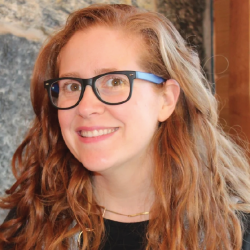
- Director
Rebecca Zarch is the director of SageFox Consulting Group. She has spent nearly 20 years evaluating projects supporting young adults moving through the STEM pathways and workforce development projects. She particularly loves equity-driven projects, those that involve complex organizational change and those that infuse innovation and entrepreneurship into the educational environment. Much of Rebecca's work focuses on computer science education or engineering. Rebecca received her MBA in nonprofit management at the Heller School for Social Policy and Management and her M.Ed. from the Harvard Graduate School of Education. When not working for SageFox, Rebecca enjoys NPR, reading, and hiking with her two children Raviv (13) and Danya (11).
Education, Training, and Workforce Development
